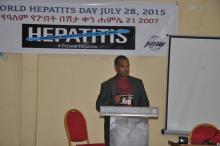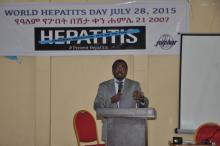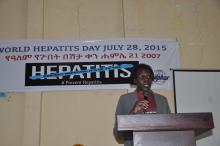Ethiopia commemorates World Hepatitis day
Ethiopia commemorates the World Hepatitis Day for the third time under the theme “prevent and act now” by expressing strong commitment to fight the viral Hepatitis disease that affects millions of its people. The commemoration took place on 28 July 2015 at Saint Paul Hospital.
A recent expert estimate shows that nearly 10 million Ethiopians are living with viral Hepatitis and many more are becoming newly affected.
WHO Communicable Diseases Team leader, Dr Esther Aceng, noted that viral Hepatitis is a serious but under-recognized global health problem, adding that the disease can be prevented using various approaches including vaccination for Hepatitis B, which is widely available. She commended the Ethiopian government for adapting the WHO normative guidelines for the prevention, care and treatment of Hepatitis B and C, adding, “I am very happy and honored that Ethiopia is already among the first 47 countries in Africa to introduce childhood immunization vaccines in their routine immunization programme to prevent Hepatitis B.”
Dr. Berhanie Redai, President of The Ethiopian Gastroenterology Association (EGA), said that the Federal Ministry of Health (FMoH), in partnership with WHO and other partners, has made progress in developing a National Viral Hepatitis Guideline and succeeded in putting Hepatitis surveillance in the National Demographic Health Survey. He added that Hepatitis poses a serious threat worldwide as it can kill more than 4,000 people every single day. The good news being that if awareness is created, and treatment and vaccination is provided on time, the disease and its impact can be controlled.
Dr. Addis Tamire, Director General, Office of the Minster of Health, said that the government of Ethiopia recognizes the burden and magnitude of the problem caused by Hepatitis in the country and puts special emphasis on the prevention and control of Hepatitis B and Hepatitis C.
Dr. Addis also said the FMOH will soon start immunizing children immediately after birth to minimize their risk of contracting the virus. “We are also planning for local production of the medicines to treat viral Hepatitis," he said. "We will intensify childhood immunization. We are discussing with our partners including pharmaceutical companies to make the medication more accessible for the poor,” Dr Addis added.
At the commemoration event, plans for making Ethiopia a viral Hepatitis medicine hub for Africa through local production were discussed.
The theme this year focuses on prevention of Hepatitis B and C that affects hundreds of millions of peoples worldwide, causing acute and chronic liver disease and killing close to 1.5 million people.
For more information, please contact
Dr. Esther Mary ACENG-DOKOTU
Team Leader, Communicable Diseases
email: %20acenge [at] who.inttarget="_blank"
or
Biniyam Fisseha,
Communication Consultant
email: fissehab [at] who.int
Photo: WHO Ethiopia/Biniyam F.






